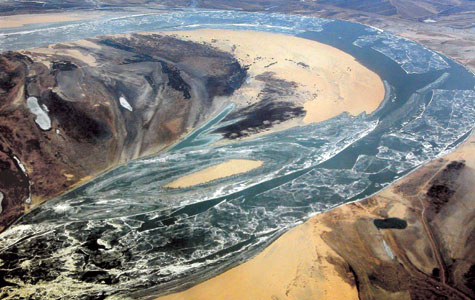
Songhua River in northeast China suffers a
major pollution incident owing to the explosion of a petrochemical plant at the
upper reaches. The river is expected to carry poisonous substances into Harbin
which cuts off the tap water to its 3.8 million residents. [Photo: Li
Chen]
The Songhua River is expected to carry poisonous substances into Harbin,
capital of Heilongjiang Province, early this morning, due to an explosion at a
petroleum and chemical company earlier this month.
The city cut off the
tap water to its 3.8 million residents on Tuesday, and closed schools for
several days to prevent an outbreak of disease.
It turned the water back
on yesterday, however, after confirming the polluted water wouldn't arrive in
the city until today.
The provincial finance department has allocated 10
million yuan (US$1.23 million) to clean up the pollution, an official with the
State Environmental Protection Administration said yesterday.
A
spokesman for the Heilongjiang provincial government said that poisonous organic
substances, mainly high-density benzene and nitrobenzene flowing down the
Songhua River, will arrive in Harbin around 5am today.
Several river
monitoring stations reported that benzene levels in the polluted water were more
than 28 times allowable standards yesterday.
The polluted water is
expected to flow out of Harbin on Saturday morning, the spokesman said.
The pollution was caused by a series of explosions at the Jilin
Petroleum and Chemical Company, which is located along the bank of the Songhua
River, that leveled two of the plant's fuel towers where highly flammable gas
benzene was being processed on November 13.
The river is the main source
of drinking water for Harbin. Water supply will be cut off today again, and is
not expected to resume until the polluted water leaves the city.
"As the
exact time when the pollutants will flow into the city's drinking water intake
spot has been confirmed, we hope residents will take time to buy as much water
as possible ahead of the water cut-off," said an executive with the city's water
company.
He said that the company would wait for the government's order
for the final cut-off of water supply.
An official with the State
Environmental Protection Administration said the provincial governments in Jilin
and Heilongjiang have activated contingency programs for environmental
incidents, and have taken measures to ensure the safety of drinking water.
He said Jilin had quickly blocked entry of the pollutants into the river
and discharged water from a reservoir to dilute pollutants in the river. It also
organized environmental, water conservation and chemical experts to discuss
pollution control plans, and beefed up monitoring work.
The official
said environmental officials started to monitor water quality along the
1,897-kilometer-long Songhua River on November 13, the day of the explosions.
He said monitors have reported that the level of pollution in the river
is declining.
Officials in Harbin also said yesterday that they can meet
demand for major daily necessities, especially water, sugar, salt and
disinfectant, for at least one month. Many supermarkets in the city have run out
of bottled water and boxed milk.



